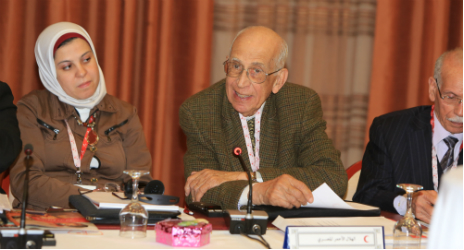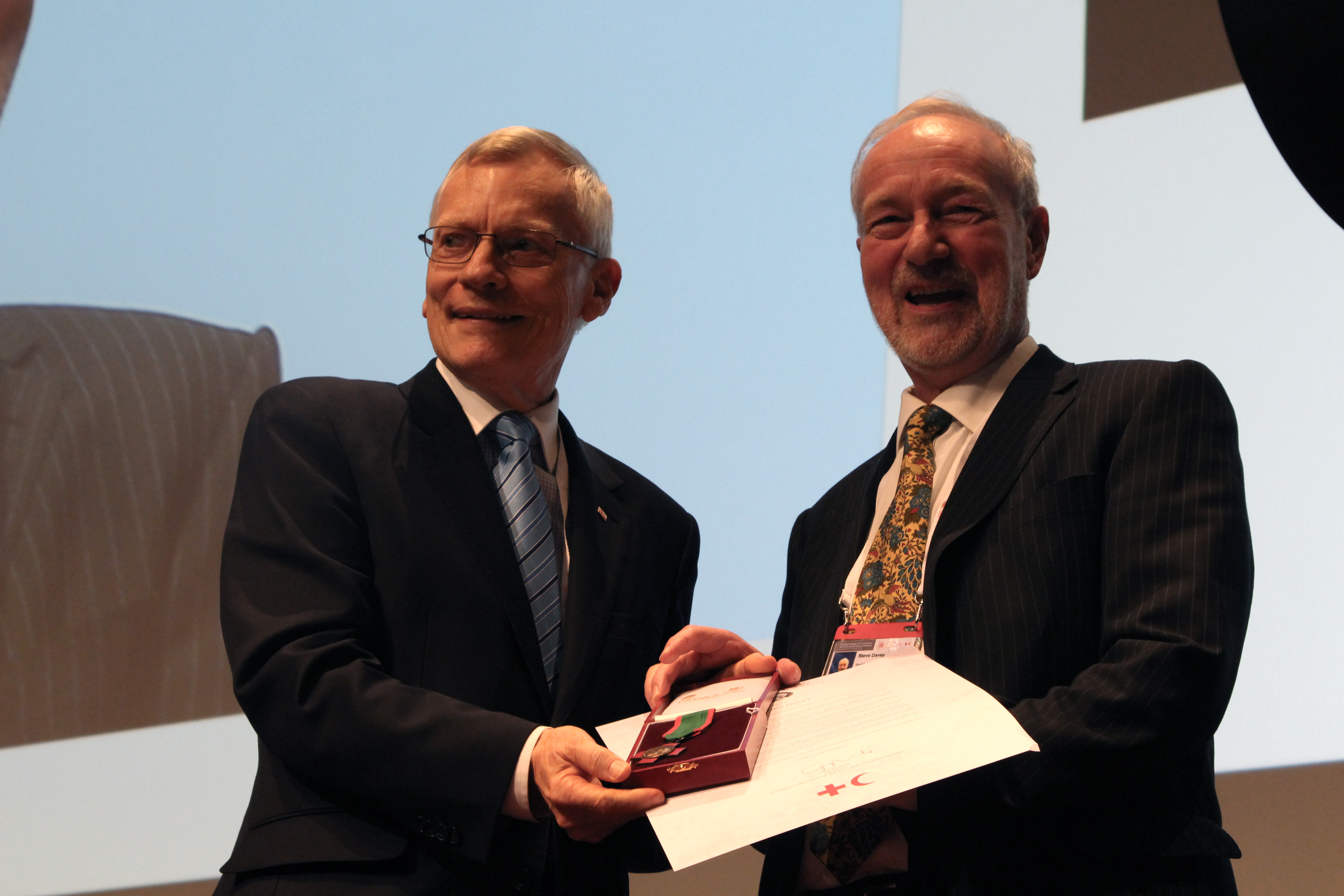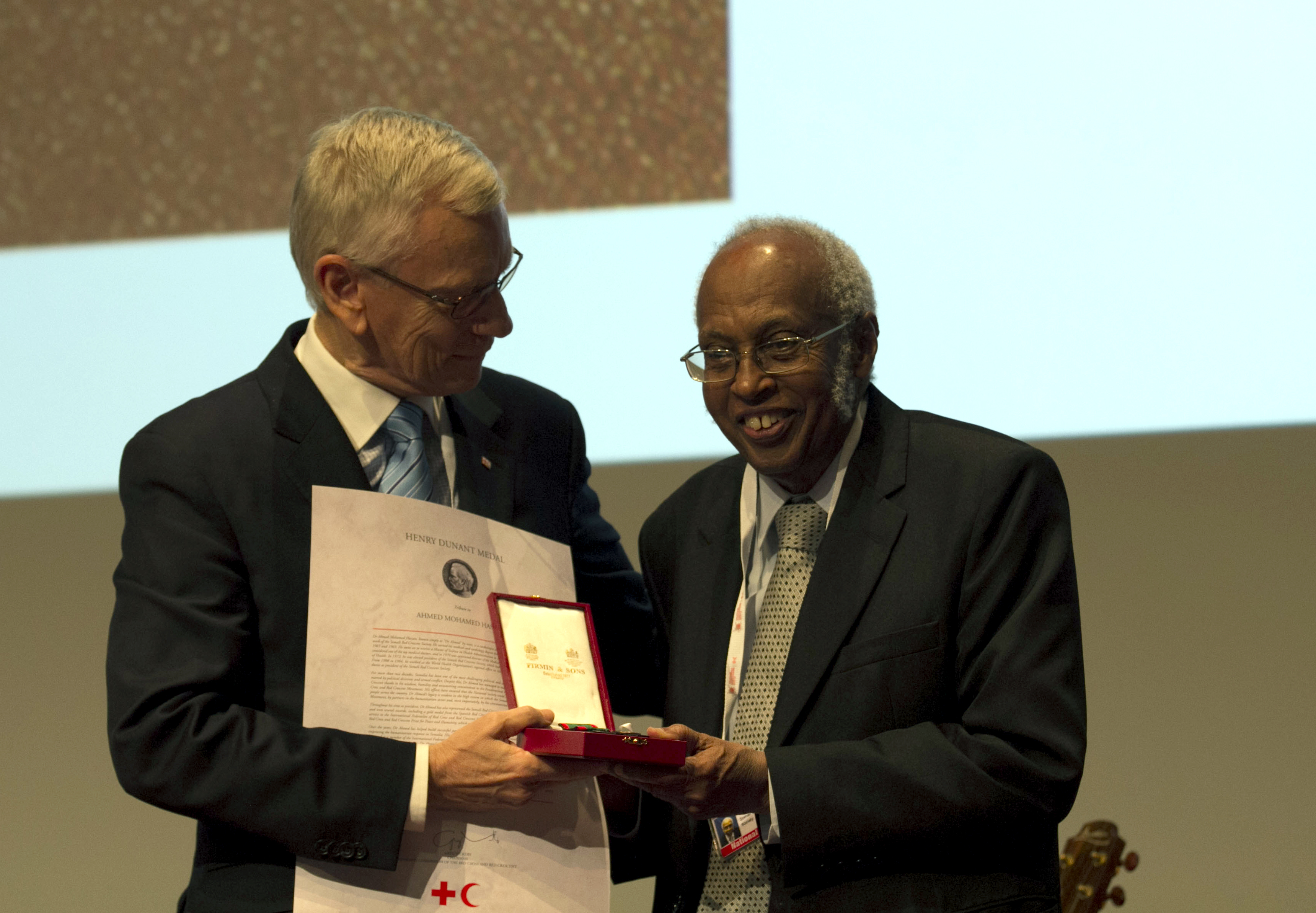2015 Henry Dunant Medal Winners

Prof Dr Mamdouh Kamal Gabr
Former Secretary General of the Egyptian Red Crescent Society (Extraordinary posthumous award)
A national of Egypt, Professor Mamdouh Kamal Gabr became Secretary General of the Egyptian Red Crescent in 1991 and remained in that post till the end of his life.
A national of Egypt, Professor Mamdouh Kamal Gabr became Secretary General of the Egyptian Red Crescent in 1991 and remained in that post till the end of his life. As Secretary General he developed the Egyptian Red Crescent to be a strong and efficient organisation and managed to improve and expand its services to meet the increasing needs of the vulnerable. He strengthened the Society’s capacity in both emergency-related activities and empowered the youth and volunteers at national and international levels. Under Professor Gabr’s leadership, the Egyptian Red Crescent weathered social and political turbulences and continued to embody the Movement’s humanitarian ideals in rough times, while at the same time providing assistance and support to Sister Societies in the region and beyond.
During Professor Gabr’s tenure, the Egyptian Red Crescent Society was active at the regional and international levels, and played a pivotal role in fostering closer relationships between Societies in the Middle East and Africa. In 1999, he was elected President of the International Conference of the Red Cross and Red Crescent. In 2006, Professor Gabr consistently demonstrated his adherence to the Principles of Impartiality and Independence through his participation at the International Conference, where he was vital in solving the issues that kept Magen David Adom in Israel and the Palestine Red Crescent Society out of the Red Cross and Red Crescent Movement. His upholding of the Movement’s values and ideals won him deep admiration and broad applause from different parts of the world, both within and outside the Movement.
Dr Gabr trained as a medical doctor and specialized in pediatrics. He had a long and rich career in medicine and was, successively, director of the University Children’s Hospital at the University of Cairo, and head of the Department of Pediatrics at the University of Cairo from 1986 to 1989.
Professor Gabr held important positions in the public sector, and served as Minister of Health from 1978 to 1982; he then entered the Egyptian parliament. He was elected chairman of the National Committee for Nutrition and remained in this post until his passing.
Professor Gabr was the embodiment of wisdom and vision, and was also active internationally in the work of the Movement. Among many important positions, he was Vice-President of the International Federation, a member of its Governing Board, and a member of the Standing Commission working group on the Emblems. He always succeeded to give wise counsel to untangle seemingly insurmountable problems. A man of insight and moral integrity, Professor Gabr left behind him a rich legacy to the Movement.
For his personal commitment and his important contribution to the development and promotion of the Movement’s Fundamental Principles and ideals, the Standing Commission of the Red Cross and Red Crescent has unanimously agreed to award Professor Mamdouh Kamal Gabr the Henry Dunant Medal, the International Red Cross and Red Crescent Movement’s highest distinction.

Mr Stephen Davey
Former Under-Secretary General IFRC
Stephen Davey first joined the International Red Cross and Red Crescent Movement in 1970 as a volunteer on a disaster-response team after a devastating cyclone hit Bhola Island in what is now Bangladesh. Once work there had come to an end, he returned home to the United Kingdom and joined the British Red Cross.
Mr Davey later came to Geneva to work for the League of Red Cross Societies, initially in the Relief Bureau. Then, from 1973–1975, he helped Dr Donald Tansley to conduct a study on the role of the Red Cross. The findings of that study were published in the far-sighted Tansley Report, which laid the groundwork for many of the modernizing changes that transformed the League over the following decades into today’s International Federation.
After a period away from the Movement, Mr Davey returned and spent several years alternating between Geneva and abroad. He began as a delegate in southern Africa before heading up the Eastern and Southern Africa Desk in Geneva, a newly created unit. Mr Davey then moved back to the British Red Cross to spend three years as director of the Home Division.
After that, he came back to the International Federation to work as director of operations, before spending twelve years as an under-secretary-general. In the various roles he took on he was involved in operational responses to disasters and emergencies, building the capacity of National Societies, developing policy and improving communications.
Over the course of his career, Mr Davey has helped develop or been in charge of developing several major policies, such as the Strategy for the Eighties, the Strategic Work Plan for the Nineties and Strategy 2010. Along the way, he breathed new life into the International Federation’s work on the Fundamental Principles; oversaw the adoption of new, modern means of communication; and revitalized the secretariat’s media and communications, which brought greater attention to the work of National Societies.
Mr Davey never flagged in his enthusiasm for encouraging and supporting staff and volunteers from across the Movement, helping them gain the courage and confidence to pursue their humanitarian goals while upholding the Fundamental Principles – principles that he has embodied in all his years with the Movement. He has been a voice of reason, a problem solver, a builder of bridges in the often tumultuous times in which the Red Cross and Red Crescent operates.
For his commitment and contribution to the development and promotion of the Movement’s Fundamental Principles and ideals, the Standing Commission of the Red Cross and Red Crescent has unanimously agreed to award the Henry Dunant Medal, the Movement’s highest distinction, to Stephen Davey.

Mrs Monowara Sarkar
Bangladesh Red Crescent Director (RFL)
Monowara Sarkar has dedicated her life to alleviating the suffering of people who have lost contact with their loved ones owing to armed conflict or natural disaster.
As a young woman, Ms Sarkar wanted to become a primary school teacher, but in 1971 armed conflict forced her to flee her village in Bangladesh. Shortly afterwards she began working for the International Committee of the Red Cross (ICRC) in Dhaka, as a tracing officer in the field.
She threw herself into her work on restoring family links (RFL) and helping with repatriations. Over the following four years she survived shelling in Dhaka and death threats, and ended up helping those who once threatened her. The danger did not deter her – she remained passionately committed to helping people find their loved ones.
In 1975, when the ICRC concluded its operation in Bangladesh, Ms Sarkar was chosen to set up the tracing department of the Bangladesh Red Crescent Society. The project was supposed to last six months; she stayed there providing RFL services for the next 40 years.
Ms Sarkar has been awarded the Henry Dunant Medal not only because of her long service to the International Red Cross and Red Crescent Movement, but also because of her innovative methods. She spared no effort to persuade the National Society’s leadership and the local and national government to allow visits to foreign detainees. In 2001, after years of negotiating, she finally got permission from the government to begin offering RFL services and aid to foreign detainees. Now the National Society has access to any prison housing foreign detainees, and visiting them has become one of the main RFL services.
Ms Sarkar’s passion for RFL has not diminished with time – not while there are still people who need her help. Migration is an issue around the world, and Bangladesh is no exception. She can still be found hard at work in the field assisting Bangladeshis who are returning after painful experiences.
Even after so many years, she is still brought to tears when she hears the stories of people who have lost contact with their families. It is her empathy that has kept her doing RFL work for so long. The message she instils in all junior officers and young volunteers is this: feel and understand in your heart the agonies and anxieties of people who are separated from their loved ones, and try to ease that pain as much as possible.
For her 44 years of humanitarian work and her devotion to people who have lost contact with loved ones, the Standing Commission of the Red Cross and Red Crescent has unanimously agreed to award the Henry Dunant Medal, the Movement’s highest distinction, to Ms Sarkar.

Dr Ahmed Mohamed Hassan
President of the Somali Red Crescent Society
Dr Ahmed Mohamed Hassan, known simply as “Dr Ahmed” by most, is a cardiologist who has spent decades championing the work of the Somali Red Crescent Society.
He earned his medical and cardiology degrees from the University of Padua in Italy, in 1965 and 1969. He went on to receive a Master of Science in Health Administration in Alexandria, Egypt. In Somalia he was considered one of the top medical doctors, and in 1970 was appointed director of the Medical Services Department of the Ministry of Health. In 1972, he was elected president of the Somali Red Crescent Society, which had been formed only seven years earlier. From 1980 to 1984, he worked at the World Health Organization’s regional office in Alexandria, Egypt, before resuming his duties as president of the Somali Red Crescent Society.
For more than two decades, Somalia has been one of the most challenging political and security environments in the world, marred by political divisions and armed conflict. Despite this, Dr Ahmed has managed to maintain the unity of the Somali Red Crescent thanks to his wisdom, humility and unwavering commitment to the Fundamental Principles of the International Red Cross and Red Crescent Movement. His efforts have ensured that the National Society could deliver vital services to vulnerable people across the country. Dr Ahmed’s legacy is evident in the high esteem in which the Somali Red Crescent is held within the Movement, by partners in the humanitarian sector and, most importantly, by the communities he has done so much to serve.
Throughout his time as president, Dr Ahmed has also represented the Somali Red Crescent at international events and conferences and won several awards, including a gold medal from the Spanish Red Cross and the Henry Davison Award for outstanding service to the International Federation of Red Cross and Red Crescent Societies in 2009. He and his Society also received the Red Cross and Red Crescent Prize for Peace and Humanity, which was presented by the Queen of England on 29 October 1993.
Over the years, Dr Ahmed has helped build successful partnerships with other components of the Movement with the aim of improving the humanitarian response in Somalia. His ability to find consensus proved equally invaluable during the two terms he served as a member of the International Federation’s Governing Board between 2001 and 2009, and when he sat on various commissions and advisory bodies. Dr Ahmed was a principled leader: at every opportunity, he emphasized the importance of neutrality and independence and actively promoted unity within the Movement.
Dr Ahmed is a friend to all and has been the voice of vulnerable people in Somalia, especially on building the resilience of communities affected by conflict and natural disaster. He will be remembered for his exemplary leadership and for cementing the Somali Red Crescent Society’s reputation as a principled, reliable, respected organization that has carried out outstanding humanitarian work to help the Somali people.
For his personal commitment, his contribution to the development of humanitarian work, and his efforts to promote the Movement’s Fundamental Principles and ideals, the Standing Commission of the Red Cross and Red Crescent has unanimously agreed to award the Henry Dunant Medal, the Movement’s highest distinction, to Dr Ahmed Mohamed Hassan.
